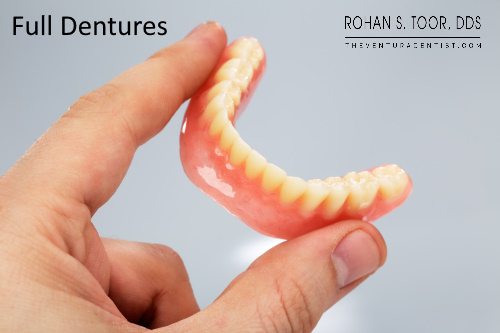 Full or full dentures are dentures that cover the whole of the mouth. A complete denture will be utilized if your top or lower teeth need to be extracted or your existing denture has to be replaced. There are three types of dentures: immediate, conventional, and overdentures. Your dentist will recommend the type of denture best suited to your condition and requirements. Dr. Rohan Toor at Rohan Toor Dental Care has over 5 years of experience with dentures since 2017 and gives professional advice on the sort of complete dentures that will fit you.
Full or full dentures are dentures that cover the whole of the mouth. A complete denture will be utilized if your top or lower teeth need to be extracted or your existing denture has to be replaced. There are three types of dentures: immediate, conventional, and overdentures. Your dentist will recommend the type of denture best suited to your condition and requirements. Dr. Rohan Toor at Rohan Toor Dental Care has over 5 years of experience with dentures since 2017 and gives professional advice on the sort of complete dentures that will fit you.
What are Full Dentures?
Full dentures are prosthetic devices produced from acrylic, dental porcelain, or ceramic. It is a detachable appliance that replaces a whole upper or lower arch of missing teeth.
What are the types of Full or Complete Dentures?
There are two types of full dentures: immediate and conventional.
Immediate Dentures
Until it is time to transition to traditional dentures, immediate dentures are worn. After tooth extraction, immediate full dentures are utilized to protect the gums and allow them to recover completely.
Conventional Dentures
Conventional dentures are permanent dentures; hence, they resemble natural teeth. Traditional dentures are custom-made and adjust to the shape of your mouth over time.
What is an Overdenture?
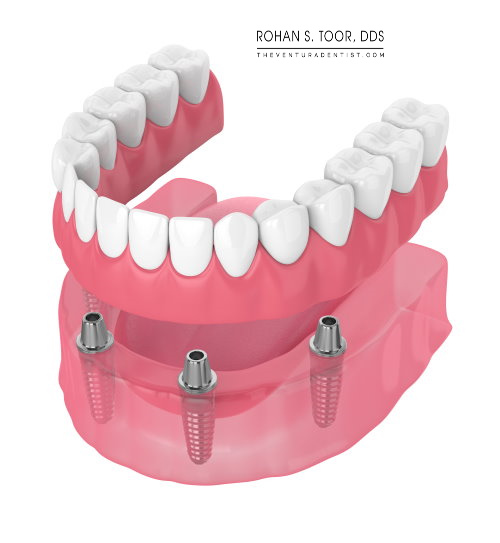
A type of denture supported by dental implants is an overdenture. Instead of gluing the dentures to the gums, these dentures snap onto the attachments of tooth implant, offering more excellent stability than conventional dentures and preserving bone density in the jaw.
Fixed implant-supported overdenture
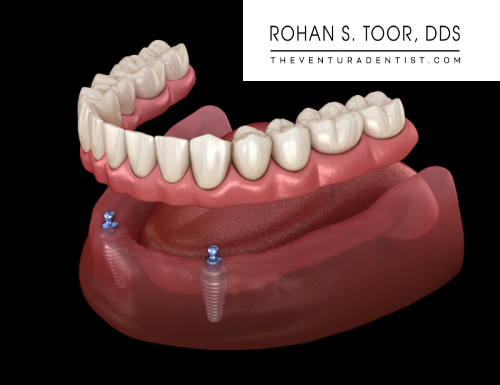
The only difference between a fixed implant-supported overdenture and an implant-supported overdenture is that the former cannot be removed. It is the most stable form of overdenture; however, cleaning it might be difficult because only a dentist can remove it.
Bar-retained implant-supported overdenture
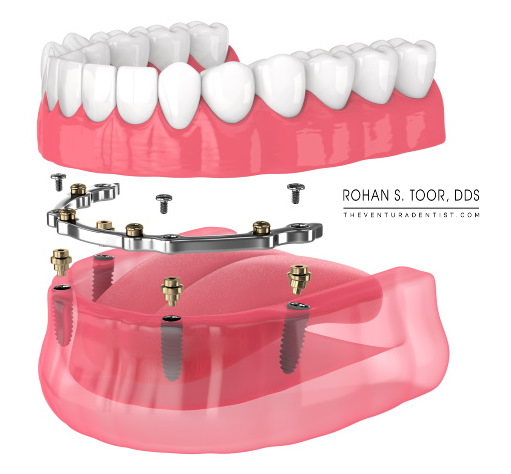
A bar-retained implant-supported overdenture attaches to the implant by a bar to which the prosthesis is attached. This arrangement allows the denture to be clipped onto and removed from the implants as needed and offers greater security than traditional dentures.
Ball-retained implant-supported overdenture
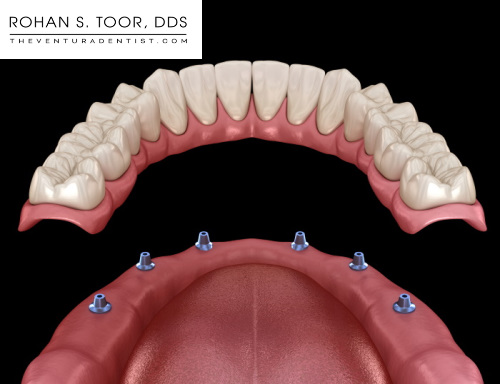
A ball-retained implant-supported overdenture is an overdenture with a ball-shaped abutment. This design provides more excellent stability and utility than conventional dentures and is an ideal choice for the lower arch, where two to four implants are often placed.
How does Full Dentures Process Work?
Because dentures are custom-made for you, a procedure is done to guarantee that their fit, aesthetics, and functionality are ideal. Typically, the whole dentures procedure comprises the following steps.
- A dental examination. A dental exam is an initial step in establishing the state of your teeth and oral health. During the assessment, we will search for any indications of illness, tooth decay, or past dental treatment that might impact the denture procedure. Before putting the dentures and removing any teeth that may require extraction, our dentist for complete dentures carefully examines the mouth for any teeth that may require extraction.
- Making dentures. Once we determine that you are a suitable candidate for complete dentures and your gums have fully healed, we will take an impression of your teeth and accurate measurements to ensure a precise fit. These measurements are transmitted to the laboratory, which will construct the dentures according to the requirements.
- Fitting the dentures. We will contact you to schedule a fitting when the dentures are complete. You should not experience any discomfort or other problems while using it. We next make any required changes to your dentures.
You will need some time to adjust to wearing your prosthesis. Once fully adapted to your dentures, you will have the same function and control over your teeth but with some difficulties when eating and speaking.
Make an Appointment with Dr. Rohan Toor at Rohan Toor Dental Care for Full or Complete Dentures
* FREE Full Dentures Consultation ($100 Value)
* FREE Digital X-rays, especially for Full Dentures ($150 Value)
* We Maximize your Insurance, so you pay less out of pocket.
How long does it take to get Full Dentures?
It usually takes between six weeks and three months, although it may take longer depending on if you need any teeth pulled, the recovery period, and other variables. As each denture is custom-made for the person, there is yet to be a set timeframe for obtaining complete dentures.
What are common problems with Full Dentures?
It takes time to adjust to new dentures, and it is usual to experience difficulties until they feel natural and comfortable in the mouth. Here are the most typical issues associated with complete dentures.
- During the initial phases of the adjustment period, soreness and discomfort are normal. The discomfort frequently results from new dentures rubbing against the mouth, creating pain and irritation.
- As you become accustomed to your new dentures, it will be challenging to talk usually.
- Because their mouths are still adjusting to the dentures or their gums are still mending, most patients find it difficult to eat normally.
- Dentures that slip are typical, especially while the mouth is still adjusting to them. During this period, the dentures become loose when eating or speaking.
Am I a Good Candidate for Full Dentures?
Full or full dentures are suitable for those who are missing all of their teeth. However, dentures may only sometimes be the best solution for people. The following are candidates for complete dentures.
- You have healthy gum tissue and jawbone.
- You are not a good candidate for dental implants.
- You have damaged, broken, or decayed teeth.
- You have difficulty chewing food.
- You have low self-confidence because of your missing teeth.
For Overdentures, you will also need to have these qualifications:
- You should have good overall health.
- You should be in good oral health.
- You should have a sufficient amount of jawbone.
- You are missing multiple teeth.
How long do Full Dentures Last?
The Journal of the American Dental Association reports that full dentures and overdentures endure an average of 10 years. During this period, your mouth and dentures may experience significant changes that compromise appearance and fit. Ensure your dental expert examines your dentures if you've been using them longer than recommended.
What do Full Dentures look like?
Full Dentures are prosthetic teeth and gums designed to resemble natural teeth. Your complete dentures will closely resemble your natural teeth.
How much do Full Dentures Cost?
Without insurance, the average cost for regular dentures is $1,800, but expect to spend between $1,000 and $3,000. The price of complete dentures varies on the type of denture chosen.
Implants and dentures are included in the price of overdentures. On average, four to six implants would cost between $4,000 to $18,000. The typical price of dentures is between $1,000 and $3,000.
The cost of immediate dentures costs an average of $1,000 to $3,000 per arch.
FAQs for Full Dentures
How many teeth are in a full set of dentures?
While the minimum number of teeth is commonly believed to be 20, some dentures include as many as 28 teeth to ensure a good bite. More teeth improve the appearance of a smile, support the soft tissues in the face, such as the teeth, muscles, and skin, and prevent a sunken appearance.
Can I have all my teeth pulled and get false teeth?
Yes, this type is called Immediate Dentures, which may be inserted immediately after the extraction of the remaining teeth. Typically, they are fabricated using imprints taken a month before the teeth extraction. Patients value this therapy since there is no time spent without teeth. However, relining or modifications will be required when the gums and jawbone recover.
Areas we Serve
Our office serves the following communities.